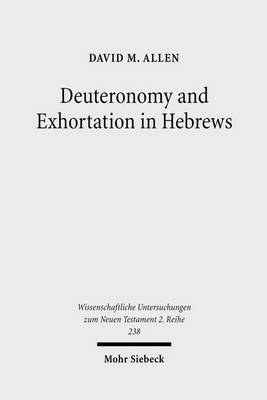Wissenschaftliche Untersuchungen zum Neuen Testament 2. Reihe
1 primary work
Book 238
David M. Allen examines the way in which Deuteronomy operates within the paraenetic sections of Hebrews, both at a micro-level (in terms of citation or allusion to the prior text) and at a macro-level (how broad Deuteronomic themes are treated within the discourse). There is extensive treatment of Deuteronomic quotations and echoes, particularly from the Song of Moses (Deut 32), as well as analysis of Hebrews' borrowing of Deuteronomy's covenantal blessing/cursing imagery. The author discusses the way in which Hebrews shares Deuteronomy's sermonic tone and paraenetic urgency, and how both texts rhetorically position their audience at the threshold of entry into their salvation goal, typified by the promised land. He further discusses how Hebrews replays Deuteronomy's use of the wilderness generation as the paradigm of covenantal disobedience and how both texts exhibit a complex interweaving of the past, present and future moments. Finally, David M Allen examines the extent to which Hebrews stands in the tradition of 're-presentations' of Deuteronomy, echoing the way in which other 2nd Temple Jewish texts alluded to it for the purposes of their respective communities. He concludes that Hebrews does not just use Deuteronomy; it becomes a "new" Deuteronomy and challenges its predecessor's contemporary hegemony.
